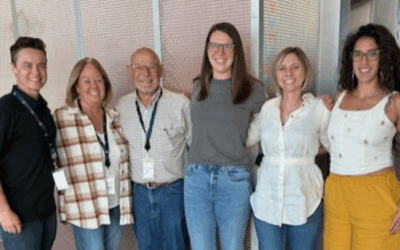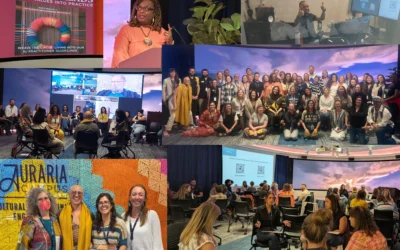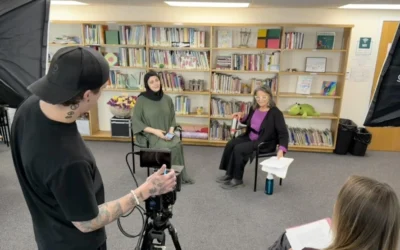A Conversation with BRITE Collaborative
CCRJP: Will you tell us a little bit about BRITE Collaborative?
BRITE Collaborative: BRITE Collaborative is a nonprofit organization located in Longmont, Colorado. We strengthen communities and relationships while contributing to equity, justice, and access by bringing restorative interventions to everyone. We see a world where individuals, families and communities engage with courage and curiosity, building bridges to strengthen our collective resilience. We understand that justice is not punitive but reparative, so we seek restoration over retribution and value each person.
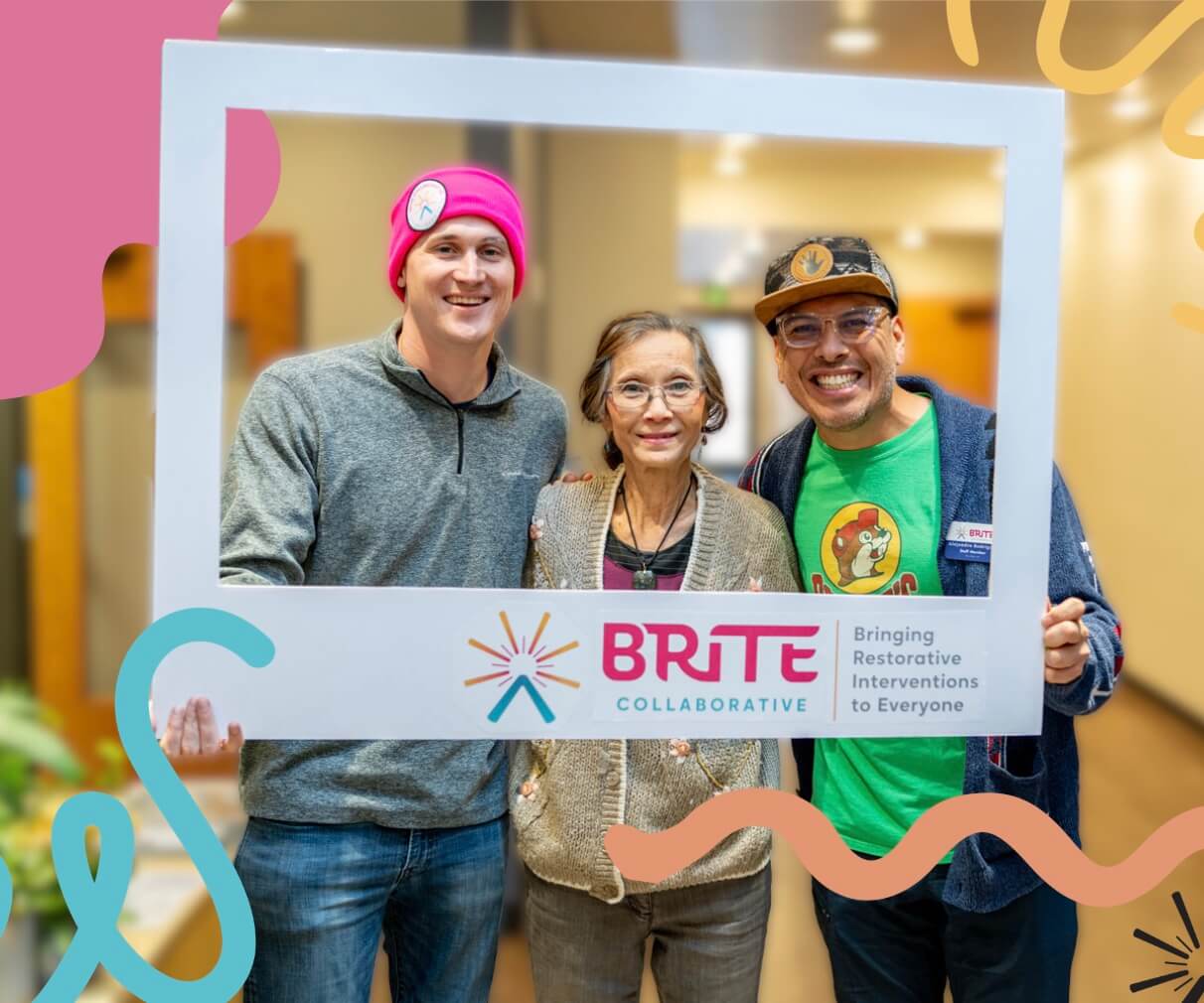
CCRJP: What is the story behind changing your name from Longmont Community Justice Partnership to BRITE Collaborative? What has that process been like for you?
BRITE Collaborative: The organization was founded as Teaching Peace, in 1994. The initial work of the organization focused on bullying, school violence prevention, and multicultural storytelling within the school system – reflecting the expertise of the founders. Shortly thereafter, we engaged with several key stakeholders to partner with us in bringing Restorative Justice to Longmont. We reached out to the police chief, the local school district superintendent, the municipal judge, chief probation officer, and director of a school for expelled students. All agreed to participate and the Longmont Community Justice Partnership (LCJP) was formed. Our collaboration with community agencies has grown and changed over the years, but Restorative Justice and Restorative Practices have remained the primary work of LCJP.
After about two decades of community work as LCJP, we can proudly say that our success rate for those who have come into contact with the justice system is consistently 95%. Therefore the path forward is to bring restorative mindsets to folks before they come into contact with the system. We want to support the implementation of Restorative Practices (a continuum of restorative interventions that includes Restorative Justice) as far and wide as possible, to literally Bring Restorative Interventions To Everyone.
We have developed training modules to work with a variety of constituents – local municipalities, public safety agencies, schools, volunteers, individuals, and anyone else who feels Restorative Practices could make a difference where they live, work, play, and learn. We are in the process of making all of our content and materials bilingual and more importantly, bicultural. Our goal is to continue to build on our legacy as a pioneering Restorative Justice agency, and use our experience to support best practices of restorative work in our community and across the state and country.
CCRJP: If you could describe the cultural “fabric” at BRITE Collaborative and how everyone works together in your organization, how would you describe it?
BRITE Collaborative: At BRITE Collaborative, we understand that to be able to bring RJ to communities, organizations, and families, it has to be woven into our own cultural fabric. We pride ourselves in hosting a restorative workplace for our staff, where feedback is encouraged, and we practice the skills to be able to have hard conversations, especially when there is a power dynamic at play. If we want the organizations that we consult with to replicate this kind of culture, we need to be living and breathing it here at BRITE.
We need to make sure that everyone at our organization feels comfortable sharing their opinions and experiences, by responding to feedback quickly and encouraging critical conversations about what we can do to be the best possible BRITE we can be. Recently we hired Alejandro Rodriguez, one of our newest staff members, in part to be a cultural broker, so we could ensure that we were able to serve the Latiné community that makes up over a third of the population here in Longmont. Two of the first things he said after he joined us in August was that 1) if we wanted to build trust with the community we serve we could do that by providing resources that made our space feel accessible to all members of the community and 2) that we needed to hire another bicultural bilingual staff member so he was not isolated in doing the cultural broker work. I am proud to relay that we just hired a second bicultural staff earlier this month and that our community closet has successfully served over 60 families in need since we opened it in November.
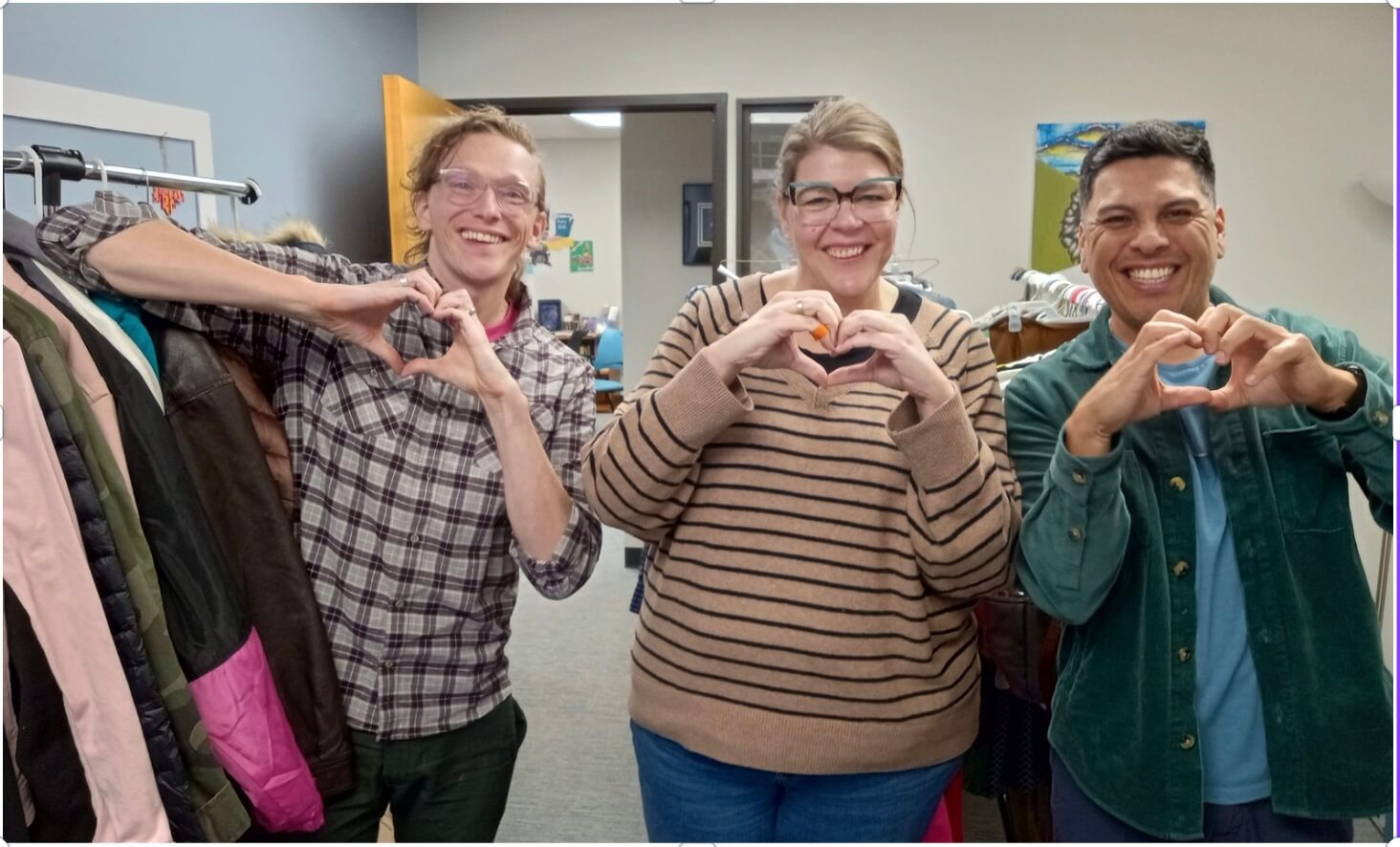
CCRJP: What recent community partnership and collaborations have you focused on?
BRITE Collaborative: First and foremost, our community closet. We have recently partnered with the Longmont community in receiving clothing donations and offering them to families in need. Many of the community closets here in town require stipulations such as ID or proof of residency which creates a hardship and sometimes even prevents families from being able to access resources. BRITE doesn’t ask any questions of families who come to our community closet and there is no limit on how many clothes they can take. The community closet lets the people of Longmont know that our space is a community space. We realize that if we want individuals to feel safe or comfortable coming to our restorative circles, we need to provide additional resources like food or clothing.
BRITE is very proud of our ongoing partnership with the City of Longmont and our REWiND program here in town. This is one of our most important partnerships as we are members of a collaborative team that is redefining what youth justice looks like in this state and country. The REWiND program is a state of the art youth deflection program that gives youth the opportunity to access services like counseling, substance use education, and/or restorative justice instead of receiving a ticket. BRITE provides the restorative justice services and ensures that every victim of youth crime (with felony offenses excluded) have the right to restorative justice. This has reduced youth tickets drastically and ensures that youth can receive necessary services in a preventive and community based way.
Another collaboration we have embarked on is creating a Restorative Approaches to Parenting class. We partnered with one of our volunteers with deep experience in both RJ and parenting to develop the curriculum. We are currently in beta mode and refining the implementation with another partner organization, Recovery Cafe Longmont.
CCRJP: Can you share anything about process innovations or program development at BRITE Collaborative?
BRITE Collaborative: BRITE Collaborative’s mission for 2025 is to be able to provide any and all of our services in both Spanish and English, including monolingual conferences, volunteer trainings, restorative approaches to parenting, community circles, and facilitator training. We want to make sure that our services are both equitable and accessible to all members of the community. We have already received strong interest in Spanish community circles and our Restorative Approaches to Parenting series, underscoring the need for this development. Similarly we are anticipating a cohort of Spanish language facilitators at our upcoming facilitator training so we will be able to continue to serve our participants with full monolingual Spanish conferences as needed.
In 2025, we also aim to make restorative justice more available and accessible to our community. We have started a monthly circle series and are already in talks with bringing more circles to the community as well as engaging in more circle work with our partners. Historically, we have focused mostly on circles of accountability, but we hope to bring more healing circles, gathering circles, and connection circles to our work, understanding that this can be a way for more people to engage in our work at a lower stakes level. In January, we hosted a healing circle for individuals to process and organize around the presidential administration change and it was an incredible experience to lean into the community during that time.
CCRJP: The 5 R’s is a learning tool that many restorative practitioners in Colorado are especially familiar with. How do these values functionally play in your organization? Can you share any insight on integrating these values into your daily practices?
BRITE Collaborative: BRITE Collaborative was founded on the Five R’s 30 years ago by Dr. Beverly Title. They are a part of our DNA dating back to our organization’s birth. We pride ourselves in spreading these pillars to our community partners and organizations. It is not uncommon to see the Five R’s posted in our local schools, our Department of Safety, and in other community organizations because their history is so closely related to Longmont thanks to the legacy of Dr. Title.
One of the ways we bring our focus to the Five R’s in our work is understanding that relationship always comes first. When we are building restorative cultures or systems for accountability, we understand that we need to ensure that there is a relationship that serves as the foundation of respect and responsibility. Whenever we experience conflict as a team or as an organization with an external partner, I always encourage us to turn back towards the relationship. If we can strengthen that piece, then the rest will follow.
CCRJP: It seems as though LCJP, now BRITE Collaborative, has always valued what the arts can do to support healing and restoration. Is there anything you can share with our wider community about that? How has art played a role in your organization?
BRITE Collaborative: Art has always been an important part of how we process our emotions and that shows up in our work in a few different ways. One of our most important partnerships is with Mirror Image Arts, a restorative theater organization that facilitates the Your Story, Your Power (YSYP) program that we host for justice involved youth here in Longmont. By integrating movement, storytelling, and acting into an accountability process, YSYP teaches these youth what safe accountability can look like. Storytelling is such an important piece of one’s journey to accountability and resolution, and there are so many ways that participants can tell their story beyond reciting it in a conference.
Painting, photography, sculpture, and poetry are other ways that art shows up in our participants’ journeys to repair and resolution. I am including one of the most recent art pieces that we received that hangs on our walls now because it evokes such strong emotion and imagery. You can really sense the feelings that the responsible person experienced during the incident and their restorative justice process and I feel so grateful that we are allowed to glimpse into these emotions and creativity of our participants.
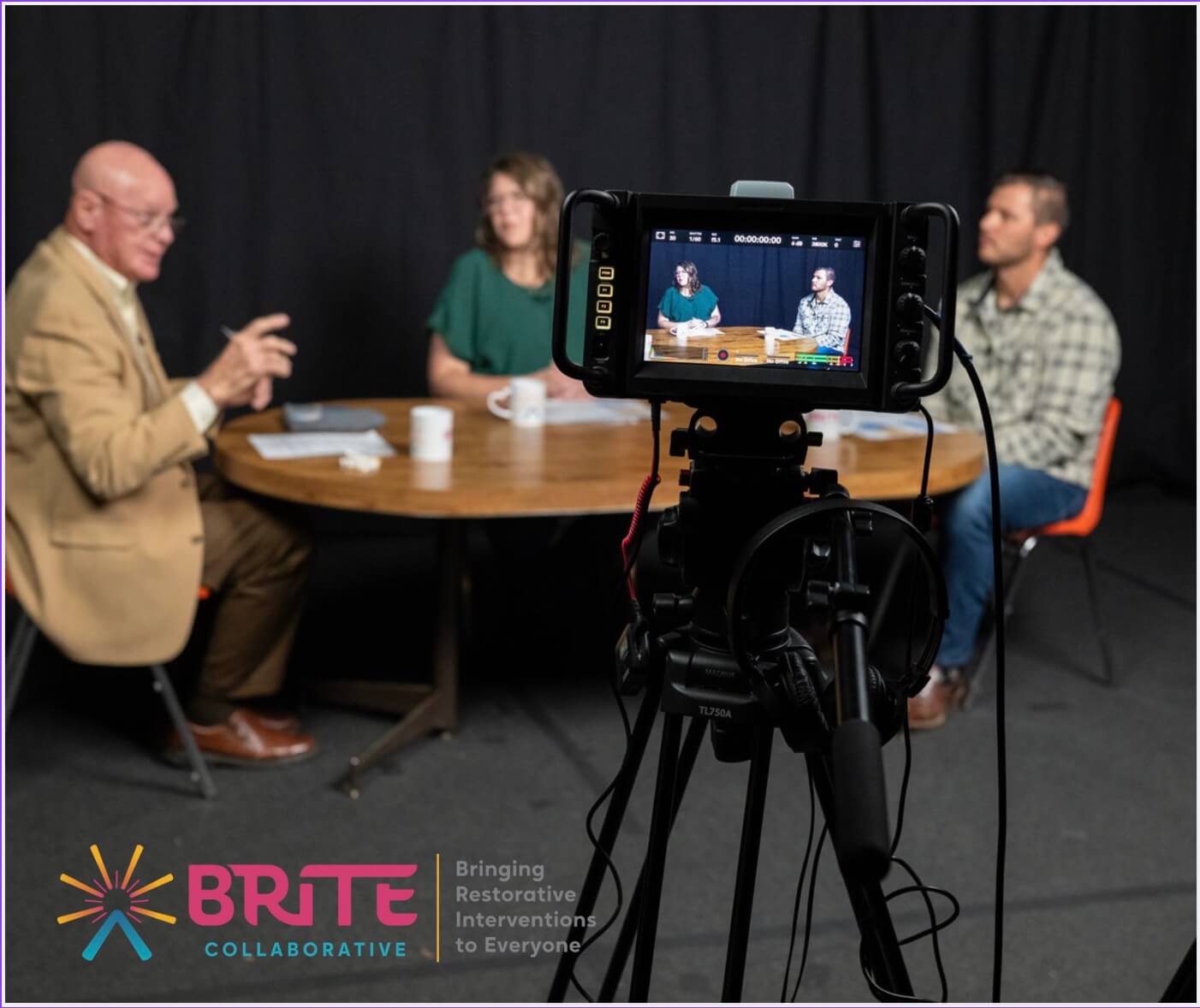
CCRJP: Is there a recent success story you can share related to someone experiencing restorative work?
BRITE Collaborative: Just last quarter, we were proud to accept a direct referral from a collision involving a vehicle and a bike. This may seem like an unconventional case, however both the responsible and harmed parties believed that restorative justice would be the best route to getting their needs met without having to involve traditional systems like the court and insurance.
We had our officer liaison ensure that we could still issue a ticket if the case was unsuccessful. Appropriate repair items for a case like this may include:
- financial restitution – to cover the damage
- educational opportunities – safe driving course
- acts of service – helping facilitate transportation
Both parties were extremely satisfied with the outcome and we look forward to creating more pathways to healing in our community.
CCRJP: What does BRITE Collaborative need from the larger Colorado network of restorative practitioners?
As we strive to create Spanish language versions for all of our restorative justice trainings, we would love to hear from other people or organizations that provide Spanish RJ trainings. We want to make sure we are using the best and most culturally appropriate language and resources in this work and would love to hear from other practitioners.
You can reach out to aiden@britecollab.org or alejandro@britecollab.org
Thank you so much!
CCRJP: What do you want others to know about BRITE Collaborative?
Check Out More Great Articles
PROGRAM SPOTLIGHT: A Conversation with the Englewood Municipal Court Restorative Justice Program
Program Spotlight CCRJP: Will you tell us a little bit about the EMC-RJ Program EMC-RJ: The EMC-RJ Program was birthed in the summer of 2021 after a...
Weaving the Circle: Reflections from the 2025 CCRJP Statewide Convening
Program Spotlight On September 18th, 2025, about 130 restorative justice practitioners, advocates, and community partners from across Colorado...
Living the Work: Colorado’s Restorative Justice Guidelines in Action
Program Spotlight Whatever your connection to restorative justice—whether you’re an experienced facilitator, a new practitioner, or just...
